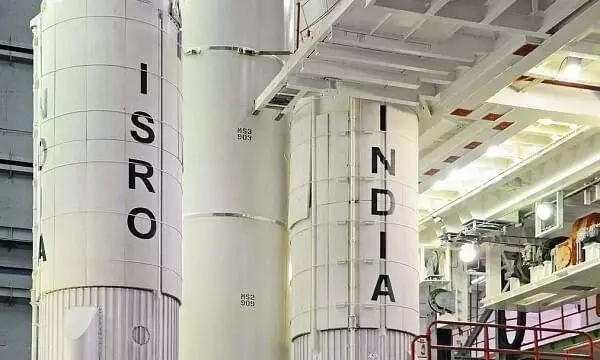
"Indo-US mission enhances, not delays Gaganyaan," says ISRO chief
text_fieldsDr. S Somanath, Chairman of ISRO, emphasized that the Indo-US Axiom-4 mission will bolster, not delay, the Gaganyaan mission.
He reassured that the collaboration would enhance ISRO's capabilities, as Indian astronaut Group Captain Shubhanshu Shukla prepares to join the International Space Station (ISS) next year.
In an exclusive interview with NDTV, Dr. Somanath highlighted that Captain Shukla’s participation in the Axiom-4 mission will enrich India's expertise in human spaceflight, benefiting the Gaganyaan mission, which aims to send humans to an orbit 400 km above Earth for at least one day.
"The progress of Gaganyaan remains on track, with delays unrelated to the ISS mission. The ISS mission will enhance our efforts, particularly in developing the first crew and service modules," Dr. Somanath explained.
He noted that India lacks experience in human spaceflight protocols, making international training invaluable. "Training under Russian and upcoming US models will add significant value to our processes. We are focusing on preparation, training, health monitoring, and crew module features," he added.
India has selected four candidates for the Gaganyaan mission, with Group Captain Shukla leading the Axiom-4 mission and Group Captain Prasanth Balakrishnan Nair as the backup. The Axiom-4 mission, affectionately dubbed 'Mission Akash Ganga,' signifies India's expanding space endeavors.
Dr. Somanath mentioned PM Narendra Modi's commitment to continuing the Gaganyaan mission, building a space station, and aiming for the Moon, necessitating a pool of trained astronauts. "Our current reliance on astronaut Rakesh Sharma and the new Gaganyatris will help us develop the necessary architecture and systems," he said.
When asked about the timing of India's human spaceflight efforts, Dr. Somanath asserted that India is progressing appropriately. "Our decision aligns with our technological readiness. Human spaceflight is crucial for our space program's evolution, and now is the right time to undertake this. Collaborating with other nations underscores that this is about humanity, not just technological prowess," he concluded.





